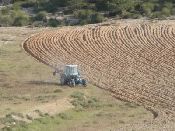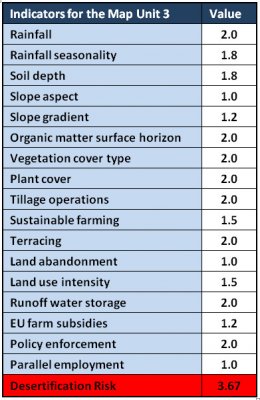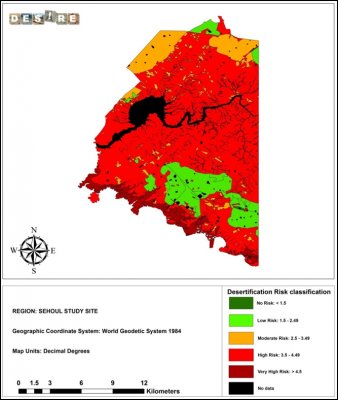| Desertification risk assessment maps |
 |
|
Source: extracted from Karavitis, C. Kosmas, C. et al. (submitted article) An expert system towards assessing desertification risk using indicators. Environmental Management
The procedure of calculation of Desertification Risk Index (DRI) in the Sehoul study sites started with the identification of the desertification process. These were found to be:
For these processes, the Desertification Risk Assessment Tool needed data to calculate 161 indicators in 11 map units. This is because only the dominant degradation process is evaluated in each map unit; the number of indicators that is needed therefore differs between map units (Table 1). By using the WOCAT database, the required indicators were estimated and used as input to the Assessment Tool. Table 2 shows an example of the desertification risk calculation for Map Unit 3 (agriculture).
The same procedure was repeated for all the other map units in the Sehoul study site and the DRI values calculated are shown in Table 1 and Map 1.
The DRI map was compared with the WOCAT QM of the same area (Map 2). It was observed that even though the DRI and the WOCAT QM approaches produced maps sharing elements of a common data base, completely different calculation procedures have been applied (the RDI uses equations independently developed from another dataset and WOCAT has its own distinct methodology). When the two maps are compared, it can be seen that the rate of degradation and the effectiveness of measures correspond closely to the DRI values, with the highest rate of degradation and the lowest measures effectiveness matching up to the highest values of DRI.
|
Study sites

Acknowledgement
The DESIRE project was
|
DESIRE brought together the expertise of
26 international research institutes
and non-governmental organisations.
This website does not necessarily
represent the opinion of the
European Commission. The European
Commission is not responsible for
any use that might be made of the
information contained herein. 




